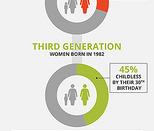Introduction
In our society it is accepted and celebrated when a woman decides to have a child. It is considered normal and obvious, even expected, that women want to marry and raise children. But what if a woman decides that motherhood is not a role she wants to pursue? It often then becomes an issue of social concern when a woman makes public her decision to remain childfree. Women who are voluntarily childless are often faced with disbelief and disapproval from friends, family, and society in general. The terms "woman" and "mother" have become very related in our society, so that it would seem to most people that you couldn't be the former without being the latter.
To many women without children, there is a big difference between being "childless" and being "childfree." To be called "childless" would imply that something is missing from their life, that something is wrong.
Women who are infertile are pitied and receive sympathy. They are then medically treated, as if diseased, to try to bring about a pregnancy and birth. This paper focuses on the voluntarily childless, who often prefer the more positive term "childfree" because the lack of children is their choice. This term does have its problems though. It can be associated with being "carefree" and that in turn implies a childlike state. In effect, no children equals no responsibilities equals being childlike...a stereotype many childfree people are placed with (Leatherby 721).
In recent decades the rates of voluntary childlessness among women has risen. This could be due to a number of factors. One of these includes recent reproductive technologies now available to women, such as birth control and safe abortion procedures, which allow them to more efficiently determine whether, when, and in what context they have children (Gillespie 225). There are...


